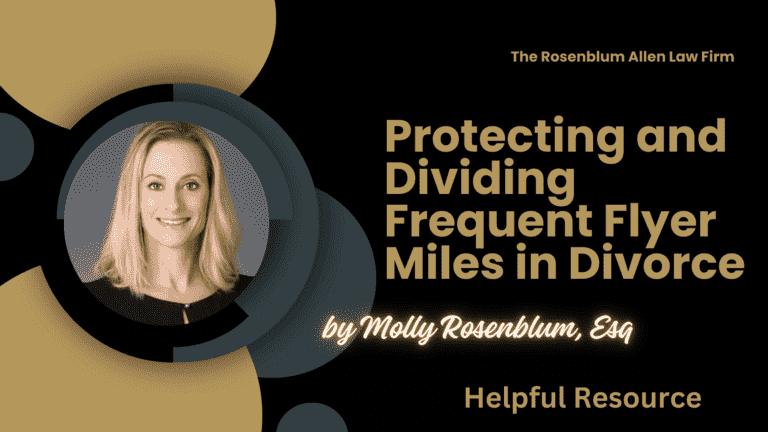How to Keep or Split Up Airplane Points When You Get a Divorce in Nevada
What Happens to Your Travel Points When You're Not Married Anymore?
Getting a divorce means you have to split up the things you own with your partner, including the frequent flyer miles you’ve collected. If you live in Nevada and get a divorce, you might wonder what happens to all those miles you’ve flown together. Here’s a simple guide to help you understand how this works in Nevada.

Understanding Frequent Flyer Miles
Frequent flyer miles are points from airlines when you fly with them. You can use these points to get free flights or other rewards. When two people are married, they often collect these miles together. But when they decide not to be married anymore, they must decide who gets to keep the miles.
Divorce Laws in Nevada
In Nevada, everything you own with your married partner is usually split 50-50. This is because Nevada is a “community property” state. That means most things you got during your marriage, even airplane miles, are owned together.
Figuring Out the Miles
To protect and divide your frequent flyer miles, you and your partner need to:
- List all the miles: Write down how many miles each has in your accounts.
- Figure out their value: Sometimes, knowing how much these miles are worth is tricky. You should talk to someone who knows much about them, like a lawyer, to help you.
- Decide who gets what: You and your partner can agree on who should get the miles. If you can’t agree, a judge might have to decide for you.
Tips for Protecting Your Miles
If you’re worried about keeping your frequent flyer miles safe when you get a divorce, here are some tips:
Keep good records: Save all the information about your miles, like how many you have and when you got them.
Talk to a lawyer: A lawyer can help you understand your rights and how to keep your miles.
Be fair: Remember that Nevada likes to split things equally, so be ready to share your miles with your partner.

Understanding the Details: Frequent Flyer Miles and Divorce
When a couple goes through a divorce, they must split up their stuff, including frequent flyer miles. These miles can be vital because they can be used for free travel or other rewards. Here is a more detailed look at what you might need to know about frequent flyer miles if you’re getting a divorce in Nevada.
Why Frequent Flyer Miles Matter
Frequent flyer miles can be worth much money, especially if you’ve been saving them up for a long time. In a divorce, they are treated like property, like a car or a house. This means that they need to be divided between both people fairly.
How to Divide the Miles
Nevada law tries to split things up equally, but with frequent flyer miles, it can be complicated. Here’s what usually happens:
- Valuation: You’ll need to determine how much the miles are worth. This isn’t always easy because the value can change based on how you plan to use them.
- Negotiation: You and your soon-to-be ex-spouse can try to work it out between yourselves. One person needs more miles because they travel a lot for work, or you can split them.
- Legal Help: If you can’t agree, a lawyer or a mediator can help you negotiate. If you still can’t decide, a judge might have to settle for you.
Protecting Your Miles During the Divorce
It’s a good idea to keep your frequent flyer miles safe while you’re going through a divorce. Here’s how you can do this:
- Separate Accounts: If you have a frequent flyer account, keep it separate from your spouse’s. This can make things more transparent.
- Documentation: Gather all the paperwork or digital records that show how many miles you have, when you earned them, and how they were used.
- Get Effective Advice: Consider getting advice from a financial advisor or a divorce lawyer. They know about the laws and can help you understand your options.
After the Divorce
Once the divorce is over, you’ll want to ensure the division of the miles is handled correctly.
- Follow the Agreement: Whatever you and your ex-spouse agreed on, or the judge’s decision, should be done as soon as possible.
- Transfer the Miles: Some airlines allow you to transfer miles to another person, but they might charge a fee. Make sure you check the airline’s rules.
- Use the Miles: If you keep some or all of the miles, consider using them before expiration. Miles can lose value over time or expire if they’re not used.

Breaking It All Down for You
Every divorce is different, and how frequent flyer miles are handled can vary from one couple to another. It’s always wise to get professional help to ensure everything is done fairly and legally.

Frequently Asked Questions
Can frequent flyer miles be divided if they were earned before the marriage?
In Nevada, any frequent flyer miles earned before the marriage are typically considered separate property and are not subject to division in a divorce. However, if those miles were commingled with marital miles or used for the benefit of both spouses during the marriage, it could become complicated. It’s best to consult a lawyer to understand how your situation will be treated.
What if my spouse used their frequent flyer miles for trips that were not for marital purposes?
If one spouse used frequent flyer miles for non-marital purposes, such as trips with someone other than the spouse or for business travel, the other spouse might argue that those miles should be reimbursed to the marital estate. The court will consider the case’s specifics to determine whether reimbursement is necessary.
Can we agree to assign a monetary value to the miles instead of splitting them?
Yes, you and your spouse can decide to assign a monetary value to the miles and compensate the other party with money or other assets of equivalent value. This is often a practical solution when the airline does not allow the transfer of miles or when the transfer cost is prohibitively high.
What if the frequent flyer program does not allow the transfer of miles?
If the airline’s frequent flyer program does not allow for the transfer of miles, you and your spouse must agree on a fair and equitable division of other assets to compensate for the miles that cannot be transferred. Alternatively, you might arrange to use the miles for mutual benefit, like booking travel for children to visit parents living in different locations.
Are there any tax consequences for transferring frequent flyer miles in a divorce?
Transferring frequent flyer miles between spouses as part of a divorce settlement does not trigger any tax consequences. However, tax laws are subject to change, and it is advisable to consult with a tax professional to ensure compliance with current tax regulations.
How do we handle frequent flyer miles if we are divorcing amicably and want to share them?
If you are in an amicable divorce situation and wish to share the miles, consider making a mutual agreement on how the miles will be used over time. This could involve booking flights for each other or agreeing to use the miles for specific purposes, like family visits or travel for children.
What if my spouse is the primary account holder for the frequent flyer miles?
Even if one spouse is the primary account holder, the miles accumulated during the marriage are generally considered marital property and subject to division. You will need to discuss how to divide these miles by transferring them or valuing and compensating for them in other ways.
How do we handle frequent flyer miles that are part of a rewards program that includes more than just flights?
For rewards programs that include more than flights, like hotel stays or car rentals, you must evaluate the entire rewards program as part of your marital assets. The division will depend on the program’s rules and the agreement between you and your spouse.
Can we keep our own frequent flyer miles separate post-divorce?
After the divorce, you can each maintain your separate frequent flyer miles accounts. Moving forward, any miles you earn would be your individual property since they are acquired after the dissolution of the marriage.
What if we can’t agree on how to divide our frequent flyer miles?
If you and your spouse cannot agree on dividing frequent flyer miles, you may need to seek mediation or go to court. A family law judge or an appointed mediator will then decide based on Nevada’s community property laws and the specifics of your case.

Glossary
Community Property: A principle of law in states like Nevada where most property acquired during the marriage is owned jointly by both spouses and is divided equally upon divorce.
Frequent Flyer Miles: Points awarded by airlines to travelers who frequently fly with them. These points can be redeemed for air travel, upgrades, or other rewards.
Separate Property: Property owned by one spouse before the marriage or acquired by one spouse as a gift or inheritance during the marriage. Individual property is not divided during a divorce.
Marital Estate: The total collection of assets and debts that a couple accumulates during their marriage, which is subject to division during a divorce.
Valuation: The process of determining the value of an asset. When it comes to frequent flyer miles, this can be complex due to their varying redemption values.
Negotiation: The direct discussions between divorcing spouses (and their attorneys) to agree on the division of their marital estate, including frequent flyer miles.
Mediation: A form of alternative dispute resolution where a neutral third party, the mediator, helps the divorcing spouses reach a settlement agreement.
Commingling: Mixing separate property with marital property can sometimes make a particular property marital property.
Equitable Division: A principle where marital property is divided fairly, but not necessarily equally, based on various factors such as the earnings and needs of each spouse.
Asset Transfer: The process of moving an asset from one owner to another, which may involve transferring frequent flyer miles from one spouse to another in the context of divorce.
Reimbursement: The repayment for using assets, such as when one spouse uses marital property for non-marital purposes and has to repay the marriage estate.
Tax Consequences: The potential tax implications that arise from transferring assets, including the possibility of incurring tax liabilities.
Primary Account Holder: The person whose name is on an account and who has the authority to manage it. In the case of frequent flyer miles, this person has control over the miles.
Rewards Program: A program businesses offer to customers who frequently use their services, providing benefits like frequent flyer miles, hotel stays, and other bonuses.
Dissolution of Marriage: The formal legal process of terminating a marriage, commonly called divorce.
Mediator: A professional who facilitates negotiation between divorcing spouses to help them reach an agreement without going to court.
Remember that the application of these terms can vary based on individual circumstances and specific legal contexts. It is often advisable to consult with a legal professional for personalized guidance.

Additional Resources for You
Our lead attorney, Molly Rosenblum Allen, Esq., has developed a wide range of resources to support and guide you through the complexities of divorce and its associated challenges. Here’s a reminder of these valuable resources:
Las Vegas Divorce Attorney: Expert legal guidance for navigating the intricacies of divorce proceedings in Las Vegas. Explore More
Alimony in Nevada: A detailed guide on understanding alimony laws and what to expect in the state of Nevada. Learn More
Divorce and Mortgage: Insights into how divorce can impact your mortgage and housing situation, with strategies to manage these changes. Understand Your Options
Divorce and Taxes: Important information on how divorce proceedings can affect your tax situation and financial planning. Plan Your Finances
Health Insurance After Divorce: Guidance on managing health insurance coverage and ensuring your medical needs are met after a divorce. Secure Your Health
Divorce and Bankruptcy: A resource explaining the interplay between divorce and bankruptcy and how to navigate these challenging situations. Navigate Complexity
Student Loan Debt Divorce: Understand how student loan debt is treated in a divorce and what it means for your financial future. Manage Your Debt
How Much is Alimony in Nevada?: Get a clear picture of how alimony is calculated and what to expect in Nevada. Calculate Alimony
Divorce Attorney Fee: Information on what to expect regarding attorney fees throughout the divorce process. Budget Accordingly
Who Gets the House in a Divorce in Nevada: Insight into how property, specifically houses, are divided in Nevada divorces. Understand Property Division
How to Not Get Screwed in a Divorce: Proactive strategies and legal advice to protect your interests and ensure a fair outcome. Protect Your Interests
Molly Rosenblum Allen, Esq. is dedicated to providing expert legal advice and compassionate support. We encourage our readers to make use of these resources to navigate through your challenging times with confidence and clarity.

Offsite Resources You May Find Helpful
For additional information and resources related to divorce, family law, and legal support, consider exploring the following offsite resources. The homepages of these organizations and services provide a wealth of knowledge that may be beneficial:
American Bar Association (ABA)
The ABA provides resources on family law, tips on choosing a lawyer, and public education about the law.Legal Aid Center of Southern Nevada
This organization offers assistance for individuals in need of legal aid in the Southern Nevada area, including family law matters.National Association of Divorce Professionals (NADP)
The NADP is a network of professionals who provide services to those going through a divorce, including legal support and education.FindLaw for the Public
FindLaw provides free legal information on a variety of topics, including divorce and family law.National Domestic Violence Hotline
This resource offers support for individuals facing domestic violence situations, which can sometimes intersect with divorce cases.National Parent Teacher Association (PTA)
While not a legal resource, the PTA provides support for families going through transitions, which can be useful during times of divorce.
These resources can offer further guidance, professional advice, and support systems that may be needed throughout the process of a divorce.

A Special Message From Our Lead Attorney

Molly Rosenblum, Esq
Dear Reader,
Thank you for taking the time to engage with the resources I’ve compiled. I understand that navigating through the intricacies of divorce can be a complex and emotionally taxing journey. The correct information and guidance are crucial to making informed decisions and shaping your future.
Please do not hesitate to reach out if you feel ready to discuss the specifics of your situation and explore how my team and I can assist you. You can call us at (702) 433-2889. Together, we can work towards a strategy that aligns with your needs and objectives.
We are committed to providing dedicated support and professional legal counsel. Let us help you get the ball rolling toward the resolution you seek.
Warm regards,
Molly Rosenblum, Esq.




